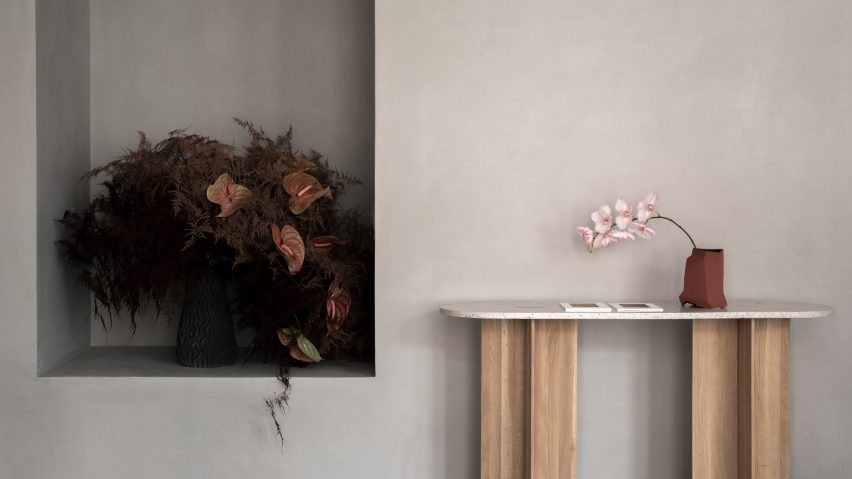Japanese furniture manufacturer Karimoku has launched a sister brand, Karimoku Case Study, which will offer collections of pared-back furniture pieces designed by architects.
Karimoku Case Study was unveiled during 3 Days of Design in an apartment-style exhibition space in the Norm Architects-designed Kinfolk Gallery.
Its inaugural collection, titled Kinuta, comprises eight pieces produced by locally-based practice Norm Architects and Japanese studio Keiji Ashizawa Design.
Made entirely from natural materials, the pieces have been designed in reference to the Kinuta Terrace apartments in Tokyo, which are arranged around a large outdoor courtyard.
To create the collection Norm Architects and Keiji Ashizawa Design added pieces to an existing set of furniture the architects recently designed for the brand.
At the centre of the room is one new piece – a gridded timber bookshelf that has been dressed with books from local independent book store Cinnober.
At the rear of the gallery, is an office-style area including a stained oak desk by Keiji Ashizawa Design, finished with a black-tinted glass countertop, which has also been created for the launch.
Some of the pieces that Norm Architects completed last year are arranged at one end of Kinfolk Gallery's main room to form a dining area in the exhibition. These include a "paper-thin" oak table and chairs with upholstered Kvadrat seat cushions.
Adjacent lies a stone-topped coffee table and a pale grey sofa, also launched in 2018. It perches on a fluffy cream Kvadrat rug to form a sitting area.
"We wanted to illustrate how big an effect tailor-made furniture can have on the overall experience of a space," explained Norm Architects.
"There are a million things that can distract us in our day-to-day lives, and finding or creating those sanctuaries is therefore vital for our wellbeing; spaces and places that provide the setting for relaxation, awareness and connectedness."
Surrounding the items in the Karimoku Case Study collection in the gallery are bespoke storage boxes by August Sangren and a black lounge chair by Sørensen Leather serve as decor.
Dotted across the mottled, stone-coloured walls are a selection of woven artworks by Danish designer Sara Martinsen. Earthy vases by local ceramist Turi Heisselberg Pedersen have also been used to dress the space, filled with various wildflowers provided by Tableau.
"The exhibition and collection embody a sense of calm; a soft, warm and minimal space composed of materials, designs and aesthetics that all elevate one another," explained Karimoku.
Karimoku Case Study intends to extend its range by inviting architects from across the globe to produce a collection of furnishings based on a particular setting.
The brand takes its name from the Case Study Houses, an experimental programme organised by American magazine Arts & Architecture between 1945 and 1966 that invited major architects of the time to create inexpensive residences for the housing boom that followed world war two.
Karimoku was originally founded in 1940 by Shohei Kato, who made timber parts out of a small shop in the city of Karina, Japan, before launching a wooden furniture line in the 1960s.
The company also has another sister brand named Karimoku New Standard, which has previously produced space-saving dining chairs.
3 Days of Design takes place annually in Copenhagen, showing off the best of Danish design. This year saw architects Bjarke Ingels and Simon Frommenwiler team up to create an installation that can be put together and dismantled like a puzzle to form a bright pink house.
Photography is by Monica Grue Steffensen.

